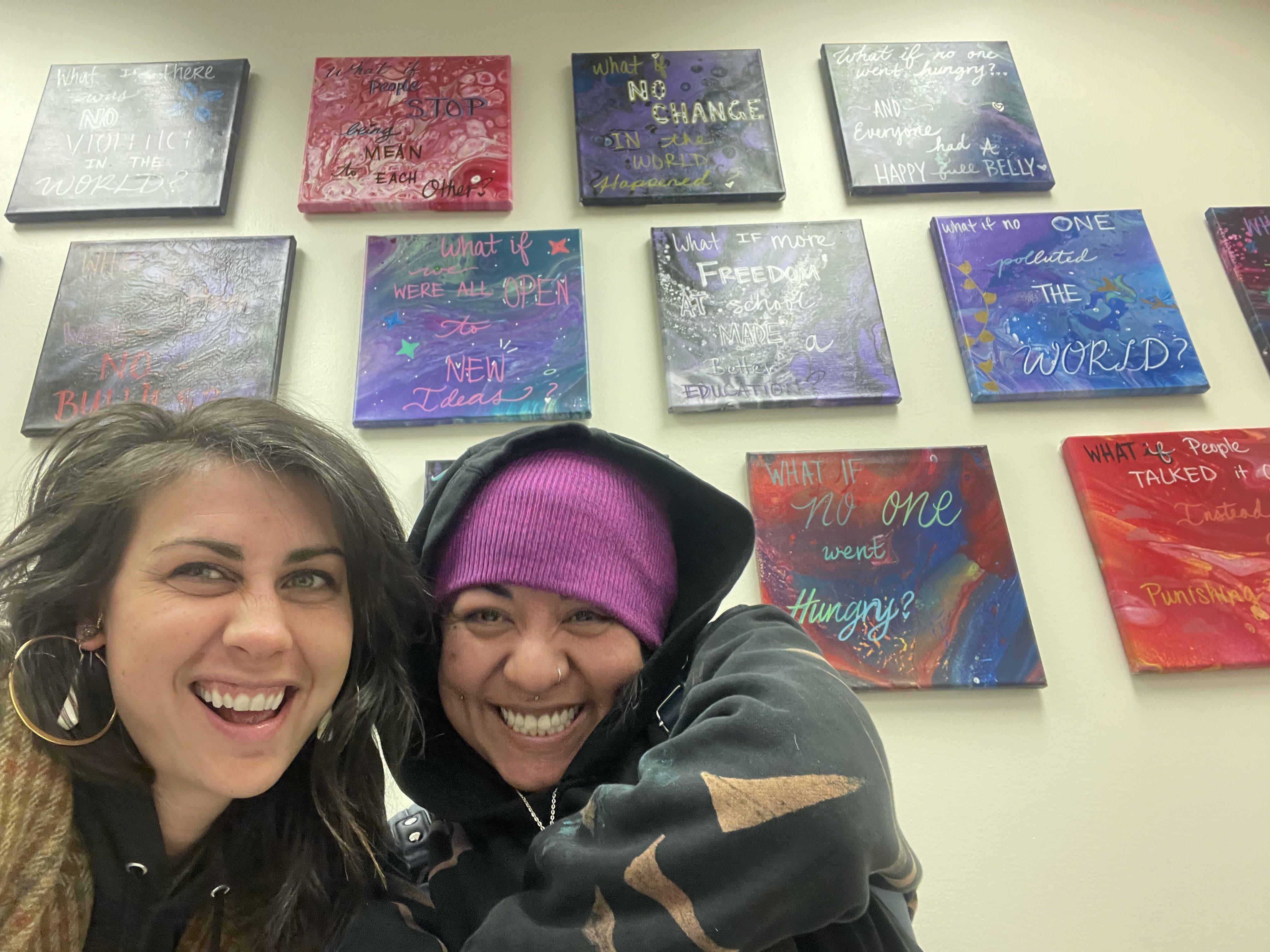
Tara Devlin with Thrive guest artist Cha Cha Flores, in front of student-created artwork Tara Devlin
Tara Devlin • November 25, 2024
From 2022-2024, the Forum ran the Thrive Together program in two Anchorage middle schools and three Anchorage high schools, reaching 1,253 students. The program aimed to increase post-secondary access and completion among students from underrepresented and economically disadvantaged backgrounds through innovative, frequent and consistent after-school programming. Like all Forum Youth Programming, Thrive was rooted in research showing that developing and maintaining a positive identity is a critical but often overlooked aspect of postsecondary access and completion programs.
AKHF's Amanda Dale spoke with ASD Educator Tara Devlin about her experiences working with Thrive.

Tara Devlin with Thrive guest artist Cha Cha Flores, in front of student-created artwork Tara Devlin
1) Tara, what’s your current job title?
I’m an ELL Expert Teacher for the Anchorage School District. I work with English Language Learners (grades 6-12th) and their teachers to build inclusive practices, a necessity for all learners, but especially for our newly arrived immigrants at schools with otherwise no other ELL programming. I’ve been working with South High School and Goldenview Middle School for the past 5 years, and added Mears Middle School this year! I support about 350 ELLs and over 250 teachers, counselors and admin across these schools.
2) How did you originally become connected with AKHF?
In my personal life, I have been a part of Alaska Humanities Forum community conversations and have used their resources for years. I was starting a new ELL program at King Tech in 2022, and the counselor who knows me from our past work together told the Thrive program I would be a good person to collaborate with. From there we built a hybrid Thrive program and credit bearing, career and technical education exploration class for a mix of multilingual students and recently arrived immigrants.
3) You hosted and co-taught Thrive programming at King Tech High School, South High School and Goldenview Middle School. What originally got you interested in partnering with Thrive?
The Alaska Humanities Forum has always done what I believe our community needs; bridging conversations. Since 2016, I have been working with my students, and training teachers, principals and organizations how to use circle conversation processes and restorative practices to create community, belonging and inclusion. I was already running circles in all of my schools and classes, and Thrive was a perfect fit to jump into our after-school programming. Their check-in circles and connection-based activities were things we were already doing-- they had fun activities, great organization with getting us on field trips and having speakers come in, they were grant-funded for snacks and supplies and the energy of two awesome trainers Eiden and Kelly was all a teacher could ask for! Heck yes, I’d love a team!
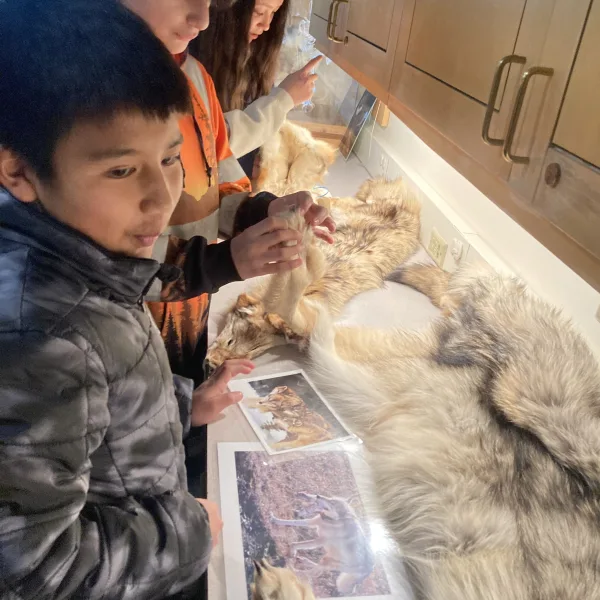
Goldenview MS students visit the Campbell Creek Science Center with Thrive
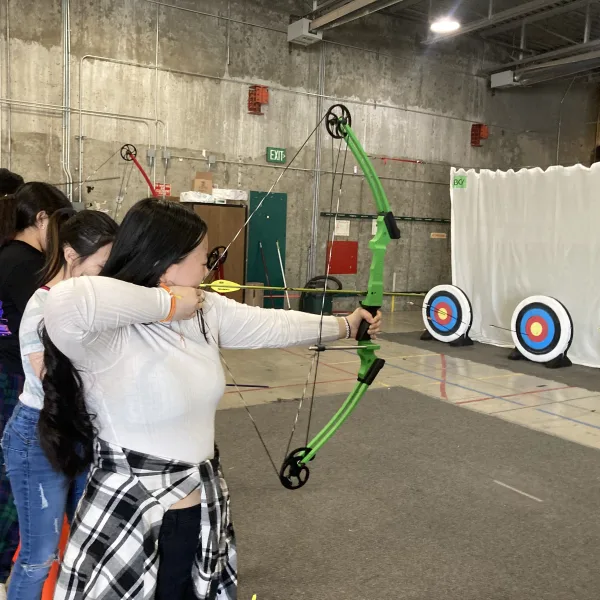
Goldenview MS Thrive students
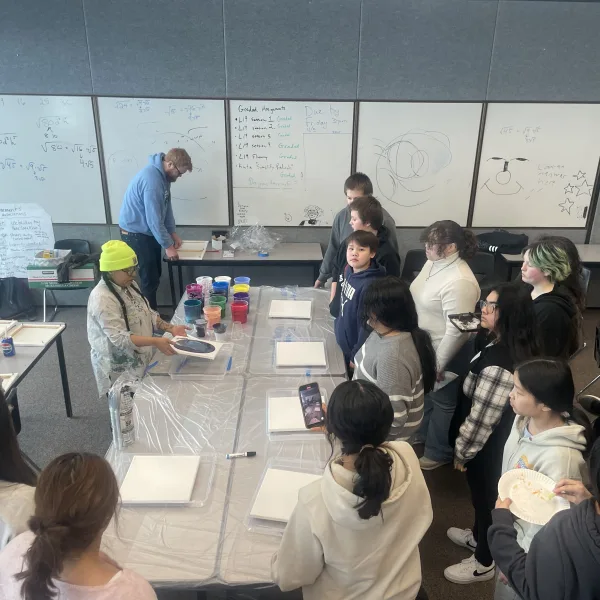
Goldenview MS Thrive students
4) What are some memories from your time with Thrive that stand out to you?
Some of my favorite memories include the time I took the middle schoolers and high school Thrive crew out to Kincaid Park for an archery class. Most students have never held a bow and arrow, and their respect for each other and the instructors and seriousness they took for safety showed the immense trust we had built to be able to do a big special trip together. The middle school principal said that he never has had middle schoolers on the same trip as high schoolers, but he said our group was so dynamic and trustworthy that he supported it fully.
The other incredible moment that brought tears to my eyes, was when we took the middle schoolers to the Campbell Creek Nature Center, held a circle and went on a hike, but first we touched all the furs and bones that the center has displayed. One of my students, a young recently arrived immigrant from a small indigenous village in Oaxaca, Mexico (a state I used to live!) touched a polar bear fur for the first time, and his incredible excitement and overwhelm for touching real polar bear fur is etched in my memory.
But I think running these groups with so many for years, my greatest memories are just being in the check-in circles with the kids who I know struggle with language and academics and from all different backgrounds, grades and social groups. For a couple hours each week, I saw them get to be kids, without cell phones or stress of school. I got to see kids listen to each other and hold space for each other in empathy, grace and a ton of laughter. It really made my job worth it, especially on the days when I wondered how much more of the public school system I could take.
5) Share about your work on the Thrive curriculum last summer. How was that experience, and what motivated you to take it on?
When Kelly [Forster] and Eiden [Pospisil], who wrote and facilitated Thrive, were both moving on to other roles, and the Thrive program didn’t get funding for another year, the idea of losing all the curriculum and all the incredible feedback and experiences was not the way to go out! This program was so needed for our students' mental health and social skills - I can’t tell you how many students changed over the course of one year or even half a year of Thrive. They laughed more, socialized outside of their groups more, they got better grades and said, many times “this feels like therapy” and “I love waking up on Wednesdays, because it’s Thrive day”. Kids need this and deserve it, especially when the schools are under staffed and overloaded and parents are under immense social and financial stress. Kids need to be seen and heard.
I worked over the summer going through every single activity and asking what was the most loved and most needed for the kids. I wanted to rewrite it for teachers and after-school facilitators to both be able to use it. Taking into account how short class periods are compared to after-school programming, I wrote it so we could expand from 15 week sessions to 30 week sessions depending on how much time you can give the activities. I also was dedicated to adding ELL modifications to every session, anything from writing the check-in question on the board instead of just saying it verbally, to building in time to define the vocabulary before doing the activities. We all learned a lot from the recent immigrants, and how to have their voices heard and gifts seen, even if they had very limited English.
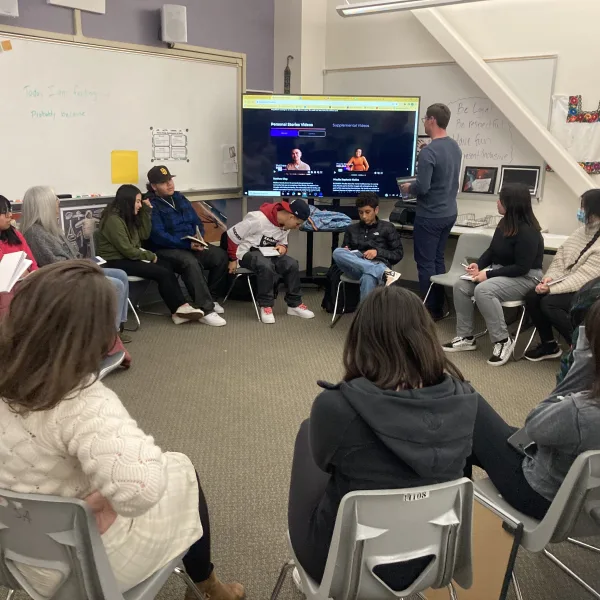
South HS Thrive students with guest Ann Ringstad of National Alliance on Mental Illness
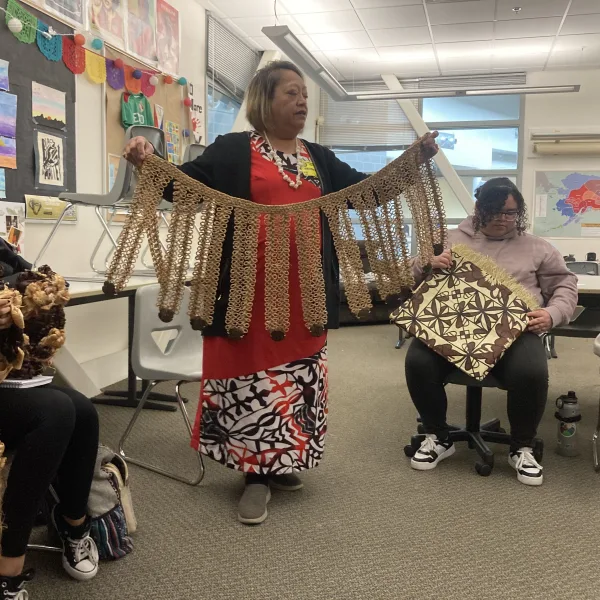
South HS Thrive students with guest Lucy Hansen
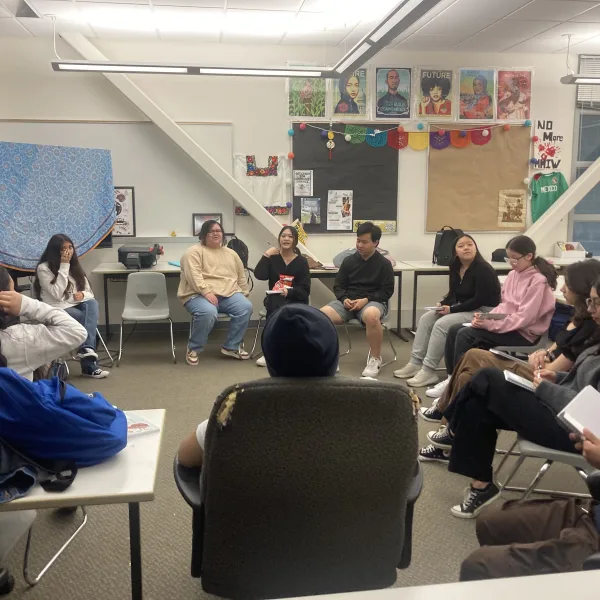
South HS Thrive students with guest Lucy Hansen
6) Anything else I should have asked you?
I just want to give appreciation to the bus drivers and the ASD, and the Principals David Nogg at Goldenview and Luke Almon at South for helping support the late bus we had for our after-school programming for two years. It took a lot of advocacy and funding, but we couldn't have had the students we did without the bus. Also, and of course, I want to give appreciation to The Alaska Humanities Forum facilitators Eiden and Kelly and grant writers Chuck and others, who believed in me being their teammate and taking my crazy ideas that needs planning and funding (like let’s do a huge mural project to have legacy at the schools!). The dedication and openness of the facilitators created the consistency and flexibility that the students deserve to receive from trusted adults, and they truly Thrived with it.
To get a copy of the Thrive curriculum Teacher Handbook, email office@akhf.org.
The Alaska Humanities Forum is a non-profit, non-partisan organization that designs and facilitates experiences to bridge distance and difference – programming that shares and preserves the stories of people and places across our vast state, and explores what it means to be Alaskan.
November 13, 2025 • MoHagani Magnetek & Polly Carr
November 12, 2025 • Becky Strub
November 10, 2025 • Jim LaBelle, Sr. & Amanda Dale